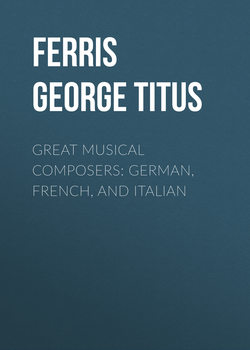Читать книгу Great Musical Composers: German, French, and Italian - Ferris George Titus - Страница 20
HAYDN
VI
ОглавлениеThe serene, genial face of Haydn, as seen in his portraits, measures accurately the character of his music. In both we see healthfulness, good-humour, vivacity, devotional feeling, and warm affections; a mind contented, but yet attaching high importance to only one thing in life, the composing of music. Haydn pursued this with a calm, insatiable industry, without haste, without rest. His works number eight hundred, comprising cantatas, symphonies, oratorios, masses, concertos, trios, sonatas, quartets, minuets, etc., and also twenty-two operas, eight German and fourteen Italian.
As a creative mind in music, Haydn was the father of the quartet and symphony. Adopting the sonata form as scientifically illustrated by Emanuel Bach, he introduced it into compositions for the orchestra and the chamber. He developed these into a completeness and full-orbed symmetry, which have never been improved. Mozart is richer, Beethoven more sublime, Schubert more luxuriant, Mendelssohn more orchestral and passionate; but Haydn has never been surpassed in his keen perception of the capacities of instruments, his subtile distribution of parts, his variety in treating his themes, and his charmingly legitimate effects. He fills a large space in musical history, not merely from the number, originality, and beauty of his compositions, but as one who represents an era in art-development.
In Haydn genius and industry were happily united. With a marvellously rich flow of musical ideas, he clearly knew what he meant to do, and never neglected the just elaboration of each one. He would labour on a theme till it had shaped itself into perfect beauty.
Haydn is illustrious in the history of art as a complete artistic life, which worked out all of its contents as did the great Goethe. In the words of a charming writer: “His life was a rounded whole. There was no broken light about it; it orbed slowly, with a mild, unclouded lustre, into a perfect star. Time was gentle with him, and Death was kind, for both waited upon his genius until all was won. Mozart was taken away at an age when new and dazzling effects had not ceased to flash through his brain: at the very moment when his harmonies began to have a prophetic ring of the nineteenth century, it was decreed that he should not see its dawn. Beethoven himself had but just entered upon an unknown ‘sea whose margin seemed to fade forever and forever as he moved;’ but good old Haydn had come into port over a calm sea and after a prosperous voyage. The laurel wreath was this time woven about silver locks; the gathered-in harvest was ripe and golden.”
